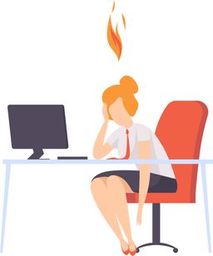3 Dangerous Mistakes Women Make That Lead to Burnout
By Jen Butler, MEd, BCC, DAIS
*This is an article from the Spring 2021 issue of Contentment Magazine.

Women from all over the world contact me sharing the struggles of their daily lives. Inevitably, they use these three words to describe how they feel about their life: stress, overwhelm, and burnout. After years of working with female professionals and talking to tens of thousands of women about what specifically stresses them out, I’ve identified the 3 dangerous mistakes women make that lead to burnout.
Mistake #1: Tolerate
What we tolerate we give permission to. So, the more women bite their tongues with family, friends, staff, vendors, bosses, and colleagues, the more they are consistently giving others permission to continue bad behaviors regardless of how it impacts them, their lives, or stress levels. Women also tolerate their slow, personal and career growth for far too long, desiring efficiency and success, but settling for chaos and flat satisfaction year after year. Massive mistake #1 is that women tolerate way too much for far too long.
Mistake #2: Ignore the Warning Signs
Stress isn’t your staff standing in a line outside your office wanting to ask you ridiculous questions, the pile of bills you stuff in a portfolio for the bookkeeper to decide which to pay, or the difficult staff you would rather dismiss than train. Stress is an internal, biological, physiological, chemical reaction that is part of your autonomic nervous system with clear and identifiable symptoms.
Acute stress (low, stress levels that spur you forward and enhance your awareness) has been shown to have positive effects on your lifestyle, while chronic stress (high-stress levels with a continual release of cortisol over time) can be disastrous. Ignoring the warning signs of chronic stress leads to headaches, dry skin, forgetfulness, fatigue, mood swings, sleepless nights, indifference, depression, and burnout. Consistently women share how they have been feeling for months or years, and it’s as if they are reciting from a medical journal on the consequences of stress. Since we can’t change what we don’t acknowledge, ignoring the warning signs of stress, mistake #2, is the same as sticking their head in the sand and waiting for burnout to take over.
Mistake #3: Going it Alone
There is a cultural attitude with women that is perpetuated and nurtured on social media, at seminars, and in the halls at work. People call it ‘empowerment,’ but many women interpret it as the need for going it alone and doing everything by themselves. In reality, it’s a conglomeration of other women’s fears, weaknesses, failures, and judgments that virally and systemically search for the next women with fractures in their confidence and small doubts in their abilities. Sadly, a giant wall is created that does nothing but hold her back from reaching out to others for support and stagnate her progress to success.
The practice of building a life, career, and/or business to success is a bell curve with a very small number of outliers able to rely solely on skill and a lot of luck, to go about it alone. The majority of women idealize the outliers, spending tens-of-thousands of dollars to attend their workshops, copy their social media feeds, or buy their programs just to become like them, all the while continuing to listen to and conform to the cultural attitude that going about it alone is the standard expectation of a successful woman. This is the most dangerous mistake of all that will keep women stressed and lead them directly into burnout.
What You Can Do Instead
Solutions to each of these mistakes are clear, but not simple nor always easy to implement. In working with these women, I’ve found specific steps help methodically undo the damage. You need a strategy and there are lots of resources out there to help. I devised the Get SMaRT™ Stress Management and Resilience Training around these principles. The below steps are in order and focus on specific elements of the stress cycle. Take them in baby-steps or jump in deep. Just move forward with each as your capacity allows and you’ll Get SMaRT before you know it.
- Know your stress: The point of knowing your stress helps you identify the kind and type of stress you are experiencing. Because our bodies don’t decipher between good stress (eustress) or bad stress (distress), any stress situation we are put in triggers the stress response process. By that theory, even too much eustress, the good stuff, can be damaging to our bodies. Knowing what stresses you out, allows you to create action plans full of appropriate coping methods to combat your unique stress. This is the first line of defense against burnout, stopping it before it even starts.
- Assess your stress: Becoming aware of your warning signs is the second step to warding off burnout. How does stress show up for you/in you? Until you know the severity of your condition, the level of impact it is having on your body, and exactly what kind of stress you are experiencing, there is no way to make sure you are using the correct coping method. For example, you can’t exercise away psychological stress nor sleep away physiological stress. These are the wrong prescriptions for your diagnosis.
There are several ways to assess your stress that provide different insights into the severity of your stress response. The highly valid and reliable Holmes-Rahe Stress Scale gives you a prediction on your risk of injury or illness. Stress self-assessments through AIS, Mayo Clinic, Cleveland Clinic, and the APA allow for online questionnaires to give you information based on your answers. Or simply asking yourself how stressed you are right now on a scale of 1 to 10, can help guide you to select the right coping methods, how many, and how often you partake in SMaRT coping.
- Reduce your stress: Step three in the journey is to Reduce Your Stress, which you can’t do by going it alone. It takes a network of the right tools, resources, information, and people for you to learn from, share with, problem solve, and lean on. Reducing your stress to stave off burnout is a result of intentional work with strategic implementation of defined coping methods. Start building your network now!
Women who address these dangerous mistakes and implement strategic solutions to counterbalance their effects will ward off burnout and find passion again. There can’t be a willy-nilly approach to habit formation. Behavior change is hard! But with a methodical way to Know – Assess – Reduce your stress, you and women around the globe can remain burnout-free forever.
ABOUT THE AUTHOR

Jen Butler, MEd, BCC, DAIS has been working in the area of Stress Management and Resilience Training (SMaRT) for over 30 years. After experiencing significant trauma in her younger years, Jen discovered the personal need for stress management and transformed her own journey, education, and career into the development of Get SMaRT ™ workshops and the SMaRT Club+ ™ membership portal. Focusing on the 11 essentials to stress management, she speaks to professionals all around the globe on the impact stress has on their lives and businesses.
Jen Butler is the owner, founder, and CEO of JB Partners, a company committed to reducing stress of private-practice owners, small businesses, and large organizations through intuitive and powerful programming, one-to-one coaching, and comprehensive consulting.
While earning two bachelor’s degrees – one in Public Health Administration and the other in Educational Psychology – Jen worked in hospitals, private practices, and became a paramedic, learning first-hand the challenges and relentless stress faced by medical professionals. Building on her education and 25-years of experience in learning & development, Jen Butler has worked with entrepreneurs, small business owners, corporate leaders, and executives on how to obtain sustainable profitability with less stress and more fulfillment. Jen is also a Diplomate of The American Institute of Stress. If you would like to learn more about the great programs at JB partners just go to jbpartners.com.
Contentment Magazine
The dictionary defines “content” as being in a state of peaceful happiness. The AIS magazine is called Contentment because we want all of our guests and members to find contentment in their lives by learning about stress management and finding what works best for each them. Stress is unavoidable, and comes in many shapes and sizes that makes being in a state of peaceful happiness seem like a very lofty goal. But happiness is easy to find once you are able to find ways to manage your stress and keep a healthy perspective when going though difficult times in life. You will always have stress, but stress does not always have you!

Leave A Comment
You must be logged in to post a comment.